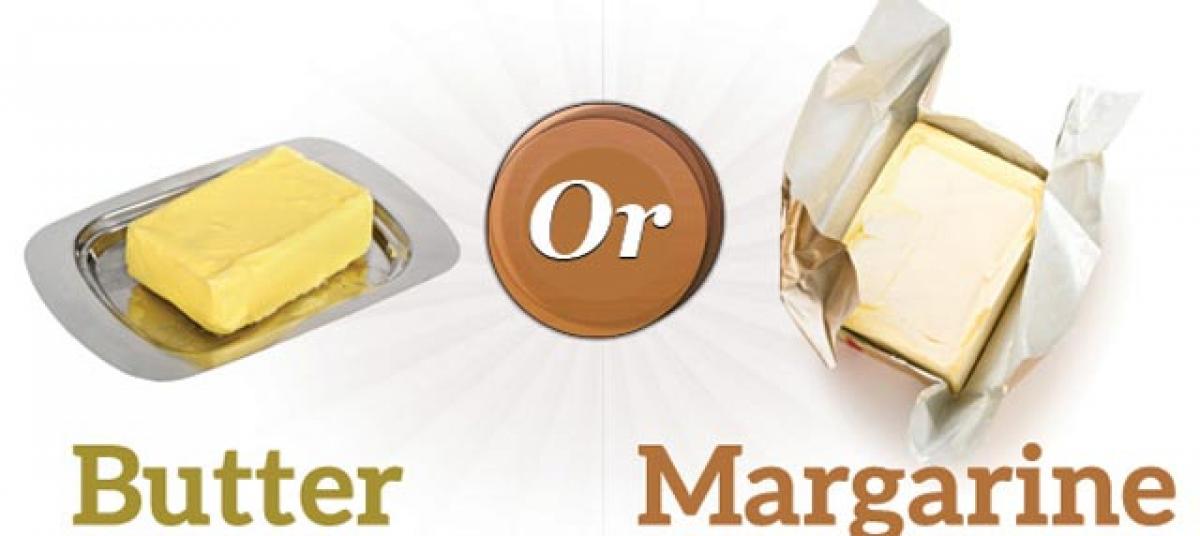Replacing butter with margarine can help

This universal confusion prevails just about everywhere - right from the breakfast table where we ponder overwhat to spread on the morning toast or at the supermarket rack where we keep wondering what to buy.
This universal confusion prevails just about everywhere - right from the breakfast table where we ponder overwhat to spread on the morning toast or at the supermarket rack where we keep wondering what to buy. With much confusion that prevails, it becomes extremely difficult and annoying at the same time to make the right choice while the quest to demystify the puzzle continues.
Let’s look at some facts about fats. There are numerous types of fat. Our body makes its own fat from taking in excess calories. External sources of fats come fromplant and animal based foods and are known as dietary fat, a macronutrient that provides energy to thebody. The worst types of dietary fat known aresaturatedand Transfats. Theyhave been blamed for high cholesterol, obesity and cardiovascular diseases. In fact, there aren’t many diseases or illnesses that these unhealthy fats aren’t linked to. But that does not mean we don’t need fat in our diet.
Fat is essential for energy and to support our body’s functions. Polyunsaturated fats, also known as essential fatty acids lower LDL cholesterol, aid in brain development, control inflammation and promote healthy skin and hair. Whereas saturated and Trans fats, on the other hand, raise our risk of heart disease by increasing the “bad” LDL cholesterol in our blood.
Making a choice between Butter and Margarine
Butter is a dairy derivative, made by churning cow’s milk and it contains around 50 per cent saturated fats and 4 per cent Trans fats. On the other hand, margarine or butter substitute have around 28 per cent saturated fat and less than 1 per cent trans-fat (most about 0.1-0.2 per cent). However, can the type of butter or margarine or any butter substitute we use really make a big difference to our health?According to a study published in the Journal of the American College of Cardiology, the answer is yes.
Researchers at the Harvard TH Chan School of Public Health conducted a 30-year study of thousands of people's diets. Researchers found replacing saturated fats like butter with unsaturated fats, like margarine, had "the most impact on reducing the risk of heart disease. “Saturated fat or “bad” fats are loaded with calories and eating them in excess raises cholesterol levels in the blood.
The researchers found that some people replaced calories from saturated fatty acids with calories from carbs, and some replaced them with healthier fats. Replacing 5 per cent of energy intake from saturated fats with an equivalent intake from either polyunsaturated fats, monounsaturated fats or carbohydrates from whole grains was associated with 25 per cent, 15 per cent and 9 per cent lower risk of coronary heart disease, respectively.
At 28 per cent saturated fat, margarine/butter substitute has less ‘bad’ saturated fat and more heart-healthy unsaturated fat than butter. It has no cholesterol.Traditionally, spreads and margarines or butter substitutes have been manufactured using the process of hydrogenation leading to the formation of Trans fatty acids. However, with technological improvements, hydrogenation is no longer required to solidify the product which has greatly helped in eliminating the problem of trans fatty acids.
It is important to note that only a few spreads in the world do not contain any hydrogenated fats, some of which are available in India. Also, margarine/butter substitute is soft and spreadable straight from the fridge, something that’s hard to do with butter. Therefore, it is a much better option for the waistline and ultimately the heart.
One healthy change we all can adopt is by saying bye-bye to butter and hello to margarine/butter substitute. It is definitely a wiser choice for people with high cholesterol or a family history of heart disease. For better health and weight management, stick to a more nutritious eating plan. Ultimately the choice is yours.

